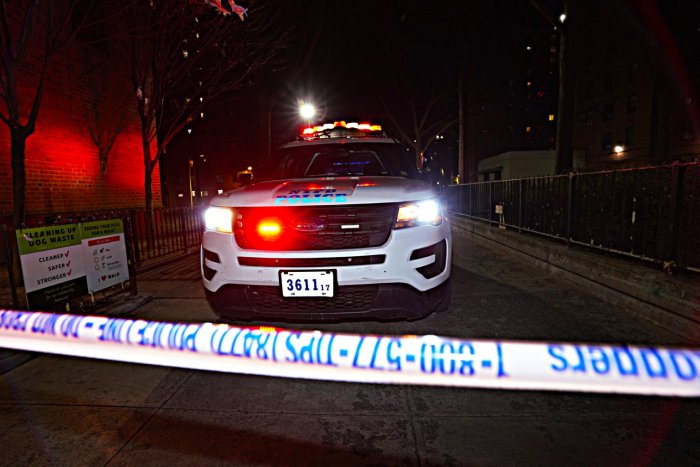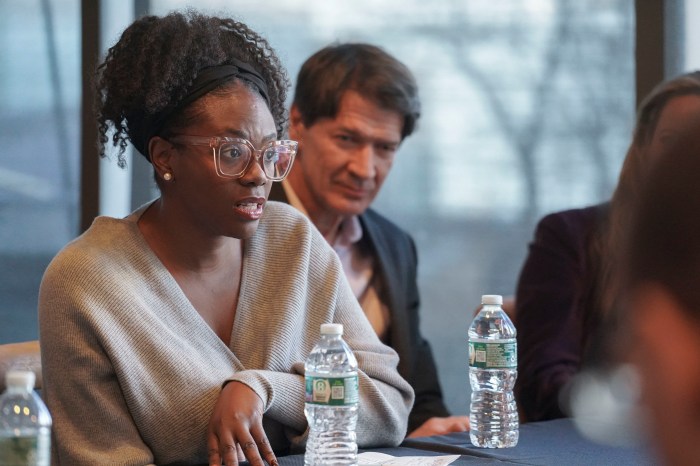By Michael Morton
During a monthlong revolt that has gripped his homeland of Haiti and prompted its president to flee, Herold Dasque said he has tried to stay away from politics. But while his job as executive director of Haitian-Americans United for Progress, a non-profit organization based in Cambria Heights, demands he appear neutral about the uprising, it has not always been easy to do so.
“You are affected by whatever goes on in Haiti,” he said of himself and the other members of the Haitian community in southeast Queens, which he estimates as comprising 40,000 to 65,000 people. “The community here is small, the community is divided and the community can be narrow-minded,” he said.
Haitians rejoiced when Jean-Bertrand Aristide became the country’s first democratically elected president in 1990. But Aristide soon adopted the authoritarian methods of his predecessors, his critics have said, persecuting political opponents, creating armed gangs to bolster his rule and allowing corruption to flourish. He was also accused of failing to find a compromise with the opposition to hold new elections.
Dasque said that as Aristide’s rule deteriorated, the Haitian community in Queens became divided into supporters and opponents of the president. The split intensified, he said, when the uprising began several weeks ago. The rebels seized the northern half of the country and threatened to march on the capital of Port-au-Prince, before Aristide stepped down Sunday and went into exile.
Dasque, who spoke during several interviews before Aristide resigned, said he did not support either side but rather wanted his countrymen to respect the rule of law and the constitution of Haiti.
“We wasted 200 years of our history by kicking our leaders out at the whims of the elites,” said Dasque.
Even though Dasque said he would not have voted for Aristide in the next election, he believes the president should have been allowed to complete his mandate.
Others in the community disagreed, but Dasque said Haitians living and working in the area usually had dispassionate discussions about Aristide’s fate. “They’re not in Haiti,” he said.
Nevertheless, Dasque said his small part of the diaspora remained divided, and that many people in the neighborhood felt a need to categorize, sometimes concluding of him, “Ah, he is for the government.”
Dasque said he has also been called a “bourgeoisie” because of his light complexion, a skin tone often associated with Haiti’s elites. When “Papa Doc” Duvalier, a country doctor with dark skin, gained the presidency in 1957, he persecuted those with lighter complexions, causing many to flee to the United States.
Duvalier’s administration descended into dictatorship, a legacy carried on by his son, “Baby Doc” Duvalier, who ruled from 1971 to 1986.
But Unlike Haiti, Dasque said in Queens “it’s more politics that cause division than race or skin color.”
Politics did not always play such a role among Haitian expatriots, Dasque said. During the years of suffering under the Duvaliers, the community was united by its opposition to the regimes of the two men.
“Since then the community has been divided,” Dasque said. “What this organization accomplished in the ‘70s we are unable to do now.” As an example, he cited HAUP’s inability to raise funds to expand its operations on Linden Boulevard.
Since the uprising began, Dasque said his organization has helped people who managed to flee Haiti with their applications for political asylum. Those asking for advice have included both students who said they were harassed by Aristide’s government and police officers who said they were persecuted by the armed opposition.
“Whoever comes in we have to serve them,” Dasque said.
Dasque became executive director of HAUP in 1998, 13 years after he left Haiti for the United States. Before his departure, he opposed the dictatorial regime of “Baby Doc” Duvalier. Although he said he was not persecuted by the dictatorship, his family was worried about him and wanted him to leave the country.
He came to the United States on a tourist visa and studied at Baruch College in Manhattan. Upon graduation he briefly tried living in Haiti, but the coup against Aristide in 1991 sent him back to New York. After years of working with Haitian civic groups, his friends at HAUP asked him to head their organization.
Since joining them, Dasque has had to deal with the ramifications of events back in Haiti, a situation he said will not change anytime soon.
Of Haiti, he said: “It has always been a complex country — small, but very dynamic and complex.”
Reach reporter Michael Morton by e-mail at news@timesledger.com or by calling 718-229-0300, Ext.154.



































